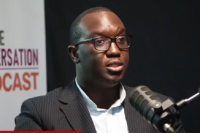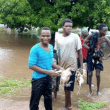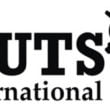The Jesuit Centre for Theological Reflections (JCTR) says Zambia is not food secure because there are still people who are going without food in hunger-stricken areas.
Last Tuesday, Agriculture Minister Micheal Katambo announced that the country had over one million tonnes of maize, representing just eight months of food security, stressing that Zambia was food secure up to the next crop harvest.
However, JCTR programmes manager Geoffrey Chongo said in an interview that despite Zambia having sufficient maize stocks to last up to next July, the country still remained food insecure due to the high number of Zambians going without food in hunger-stricken areas.
“I think what we are getting on the ground really doesn’t reflect that the country is food secure. As you might be aware, we work, not just in Lusaka, we have presence in Livingstone, Mongu, Solwezi and other small towns. People are still struggling to find food. The food that government is distributing is insufficient and families can hardly lay their hands on the food being distributed. So, to claim the country is food secure is probably a misrepresentation of facts of what is on the ground. On one hand, it could be that probably if they look at the macro-level, then we might say that food is enough to cater for everyone, but there is an issue of distribution,” Chongo said.
He said it was difficult to believe the assurance of food sufficiency when others were starving in some parts of the country.
“You can have a lot of food in the country, but if it can’t reach certain parts, a number of citizens do not have, it’s very difficult to believe that assertion that the country has sufficient food. It’s like the way we normally say that the economy is growing, Zambia is doing well at macro-level, we are a middle-income country, but look at the inequalities: how many people are living below the average income or the poverty line? The majority are living below the poverty line and yet as a country we are saying we are doing well, we are actually a middle-income country,” said Chongo.
“So, for the Minister (Katambo), it’s a bit misleading to just focus on the national statistics of food reserves; we need to look at geographically what is happening; how people are struggling to lay hands on that food he is claiming is sufficient. It might be sufficient in his home or the few areas he has visited, but I think Zambia is bigger than the few areas that they may have visited. I think we do not agree with that statement; we will ask the Minister to realize that there are other parts that are struggling. So, the food that we are claiming to be sufficient, they need to up their game in terms of distributing, otherwise, that statement is empty! We have seen TV reports in Western Province, rural areas, on how people are surviving on wild fruits, on tubers.”












